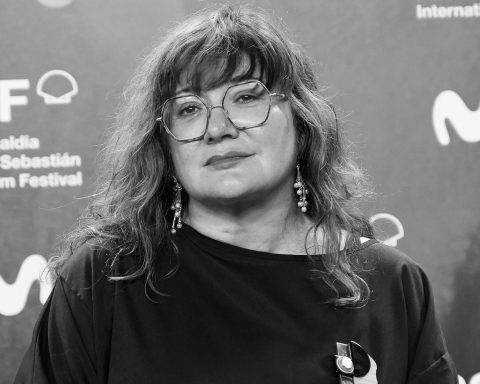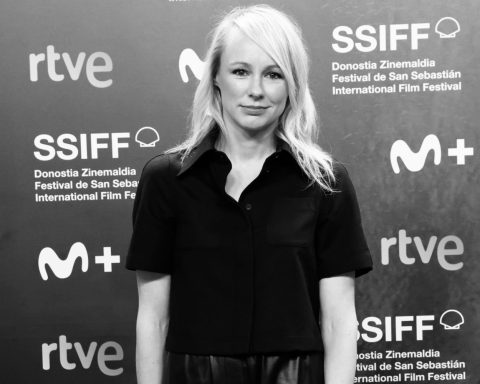Fear and loathing in the Australian outback is what Kitty Green’s sophomore feature, The Royal Hotel, is more or less about. The thrilling and suspenseful follow-up to her critically acclaimed directorial debut, The Assistant, premiered at the Telluride Film Festival before screening at the Toronto International Film Festival and vying for a Golden Shell at the San Sebastian International Film Festival.
The Royal Hotel is Green’s first film set in her native Australia and is inspired by the 2016 documentary, Hotel Coolgardie, that narrates the experiences of two young Scandinavian women who take on a temporary job at an isolated bar in Australia. Here, however, Green presents us with two American traveling friends, Hanna and Liv, who having run out of money during their backpacking rite of passage kind of trip around Australia, find a work-and-travel setup at a joint called The Royal Hotel located in a mining town deep in the Australian outback. The bar’s only clientele consists of drunk men and one woman who is more than happy to slur misogynistic and sexualized epithets at them. The pub is run by the perpetually drunk Billy with the help of his Aborigine girlfriend Carol, who is also the place’s cook.
More than presenting a terrifying portrayal of the Australian male drinking cult(ure), Green is interested in the female perspective thereof and the vehicle for this endeavour are her two formidable protagonists who navigate an unfamiliar and hostile climate so removed from the metropolitan reality they are accustomed to. Indeed, Green skilfully explores gender dynamics and drinking culture, nimbly examining Hanna and Liv’s experiences within the explosive and turbulent environment they find themselves in while looking into the basal factors that are an intrinsic part of its hostility. The film has nods to the thriller and Western genres, with moments where it also threads the very fine line with horror, but it cannot be defined as a genre film and Green performs this genre-bending balancing act perspicaciously by challenging the horror trope. Green plays with the audience’s expectations. They anticipate bad things to happen, but they don’t. In fact, Cinema has seen enough violence against women and her answer to stopping it from escalating in her film is precisely dancing on the line without ever crossing it.
What makes The Royal Hotel particularly engaging and subversive is that it tells an outback story, through a female gaze, turning the tables on a genre that has traditionally been exceedingly male, using the masculinity of that world as the fuel for the story, and examining some of the issues around male culture through the perspective of the two protagonists, which never feels reductive. This perspective comes from the relatability, to both an international audience and to an Australian audience. Moreover, the experience of the two women in the film is an experience that a lot of women have had, be it while having drinks on a Friday or Saturday night anywhere in the world, or a pub in the middle of nowhere in Australia.
The subversiveness also comes from the fact that Green never portrays the world of The Royal Hotel as so terrible that Hanna and Liv absolutely have to leave, so the unhurriedly and relentlessly constructed nail-biting questions of the film are not “Are they going to get out?” but rather the ever so fluctuating ones of “Should they get out?” or “When are they getting out?” which are not only infinitely more subtle interrogations, but also more stalwart ones as they hit the heart of this very masculine culture and what is deemed acceptable and not within it. Green plays with the audience in that sense too, because she deliberately plays with their loyalty (which is always very clear if you are a woman) and that’s where the film’s palpable tension comes from. But it also comes from the fact that she also shows that the men are caught within it as well even if they all have rehabilitating qualities that Green brilliantly portrays – especially the vulnerability – never shying away from the noxious side and indisputable danger and/or threat of masculine culture.
By showing the differences between the two characters, Green shows the subtleties in the way that women respond in these kinds of circumstances. Women in the audiences will also be attuned to the subtleties that come from interactions or relationships with men. In that sense, the film nimbly portrays the difficulty in determining the safety of certain situations and the impact it has on women.
While Glenda, the female character who assumes machist culture, represents the people who are keeping this culture alive, the empowerment is given to the Indigenous female character, who serves as a grounding reminder of strength, guts and safety. A lot of importance is given to the environment, to the nature in the sense that they condition the characters. Not only is it a story about the Australian drinking culture, but it also shows the beauty of the landscape and highlights how this particular microcosmos of behavior disagrees with the magnificence of the Outback, heightened by Michael Latham’s moody and intense lensing.
Green brilliantly works with her actors and is able to extract the most nuanced, precise and natural performances out of them. Julia Garner and Jessica Henwick give masterful turns as Hanna and Liv respectively and are aided by the superb supporting cast headed by an almost unrecognizable Hugo Weaving. All other techs are on point, especially Leah Popple’s masterfully and frighteningly accurately designed pub, Mariot Kerr’s pub/backpacking-appropriately designed costumes and Kasra Rassoulzadegan’s suspenseful and smartly paced editing.
Green ends her film with a bang. It is a provocation that will most certainly spark a more than needed conversation around what is acceptable within our culture and when we should stand up for ourselves and take a stand. This is a film that finds its exciting characteristic in its slow-burning power. It leaves you in an uncomfortable state that forces you to reconsider this simple yet powerful deliberation – when is enough, enough? The interrogation that comes with the ending is clear: should we burn the patriarchy to the ground in order to end the endemic machism, misogyny, sexual harassment and violence against women?
A thought-provoking cinematic exercise that questions the systemic broader problems permeating the current culture, and opposes female empowerment to machist behavior, The Royal Hotel is an accomplished treat that boasts terrific performances by two of today’s most promising actresses and an assured and bold directing by a female talent to watch. Smash the patriarchy!
Production: Elevation Pictures, Hanway, Neon, See-Saw Films (Australia/UK 2023). Producers: Iain Canning, Kath Shelper, Emile Sherman, Liz Watts. Executive Producer: Simon Gillis. Co-producer: Libby Sharpe. Associate producer: Billy Bowring. Director: Kitty Green. Screenplay: Kitty Green and Oscar Redding. Cinematography: Michael Latham. Costume Design: Mariot Kerr. Production Design: Leah Popple. Score: Jed Palmer. Editing: Kasra Rassoulzadegan.
Cast: Julia Garner (Hanna), Jessica Henwick (Liv), Hugo Weaving (Billy), Ursual Yovich (Carol), Herbert Nordrum (Torsten), Daniel Henshall (Dolly), Toby Wallace (Matty), James Frecheville (Teeth), Alex Malone (Jules), Kate Cheel (Cassie), Bree Bain (Office Lady)
Color – 91 min. Premiere: 1-IX-2023 (Telluride Film Festival)
Photo credits: Courtesy of the San Sebastian International Film Festival.










